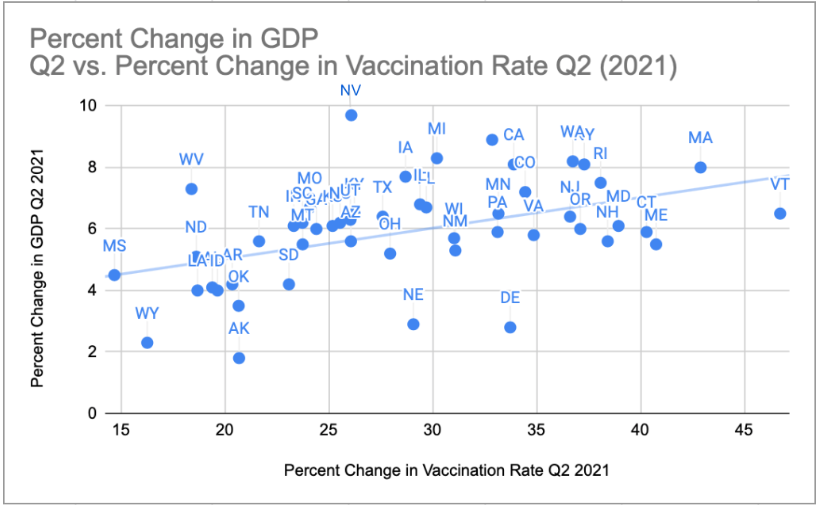The Effects of COVID-19 Vaccination Rates on States’ Quarterly GDP
Ariana Rajaee, Economics and Public Health and Sociology Major, Class of 2023
Nominating Faculty Member: Phoebe Chan
In efforts to stop the spread of the COVID-19 virus, mandatory restrictions and shutdowns were put in place for many businesses around the country. Many people in efforts to protect themselves and others, stopped having larger gatherings and remained in their homes to help prevent the spread of the virus. As a result, many businesses suffered due to the lack of revenue and volume coming in. However with the COVID-19 vaccine becoming available to the majority of the population, restrictions and mandates were slowly lifted, seemingly returning back to what was once considered normal. As vaccination rates went up, infection rates became lower. With this, there was once again a rise in economic growth despite the pandemic not officially coming to an end. Towards the end of July and into August of 2021, variants became more prevalent and research suggests that COVID-19 vaccines are less effective against variants like the delta variant, which had spread through the US. However, even with its effectiveness being lowered, the three vaccines administered in the US (Pfizer-BioNTech, Moderna, Janssen/Johnson & Johnson), still provide protection against severe symptoms and hospitalization due to COVID-19.
In ECON 361: Industrial Organizations and Public Policy, we were asked to compile raw data, transform it, and eventually create a full research paper on a topic of our choice. I chose to have my research look into economic impacts during the COVID-19 pandemic, specifically looking at the effects vaccines can have on gross domestic product (GDP). My research aimed to answer the question, “How do vaccination rates affect the percent change of GDP of states by quarter during 2021?”.
I first researched how healthy people affect economies. I learned that even before COVID-19, populations with higher vaccination rates had healthier populations that could contribute to the state’s overall economy. During my research, I also learned that mask mandates could help prevent a 5% decrease in GDP that would be caused by a nationwide lockdown.
After this, I compiled raw data from all fifty states on their quarterly vaccination rates and GDP. For vaccination rates, I looked at the percentage of adults that were fully vaccinated with two doses during quarter one (Q1) and quarter two (Q2) of 2021. When the data was calculated for percent change for each quarter and compared against percent change for each state’s GDP, both Q1 and Q2 showed trends in the data.


Q1 had a negative slope indicating that states with the lower vaccination rates had higher GDP than states with higher vaccination rates. However this slope would become positive in Q2 with the states with the higher vaccination rates having the highest GDP while states with the lower vaccination rates fell. This visually shows the short-term versus long-term effects vaccines can have. States with the lower vaccination rates were likely to have less mandates and restrictions during peak infection rates during th COVID-19 pandemic. Those states could have a higher GDP with more businesses being opened. However, as time went on, as displayed in Q2, these states had lower GDP than the states with the highest vaccination rates due to the possibility of many people becoming infected and sick, no longer able to be efficient producers of society.
Overall, with my research I learned that while there may appear to be short-term economic benefits to not having statewide shutdowns or regulations during the pandemic, when looking ahead at the long-term effects, not having a healthy population has significant negative effects. With this, states may be better off having temporary shutdowns and mandates that can limit their economic output for a short amount of time. By having temporary shutdowns and mandates to limit the spread, their overall population will be healthier in the long run, allowing them to be more efficient producers as time goes on.
-
Categories:
- Academic Festival
- Economics